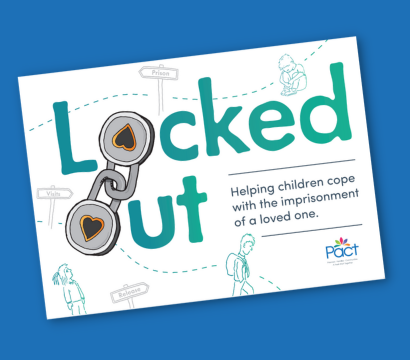
Locked Out
We often hear from parents and carers who are struggling with what to tell their children when a loved one goes to prison. Often they are torn between wanting to hide the truth from the children to “protect” them, and the desire to be open and honest with their children.
If you need any more support or information, please contact us at support@prisonadvice.org.uk.
Here you can find useful information about what and how to tell your child when someone they love has gone to prison.
You and your child may experience a real sense of loss, missing the company of the loved one who is in prison.
The typical “stages of grief” model may help you understand how your child reacts:
Your child may show disbelief and laughter and ask if the person telling them the news is joking. In response, they may switch to auto-pilot and try to carry on as usual, or they may have an extreme reaction, sobbing uncontrollably.
Supporting the child through shock:
Do not appear alarmed at your child's response – especially if it seems inappropriate (e.g. laughter). It is important to reassure your child that numbness and disbelief are normal. When explaining the situation, keep the language clear and straightforward to avoid misunderstanding. Importantly, reassure them that you are there for them and will listen to and answer their questions.
Your child may not accept the loss and pretend that nothing has happened, refusing to believe that their family member is gone. This may result in them lying about the situation to others and themselves.
Supporting the child through denial:
Give your child time to process and accept the truth – denial is a protective mechanism, and they will move past this with time. It is also important to talk openly with your child – reassure them that they can talk to you about what has happened and that they won't get in trouble for asking questions about imprisonment.
Your child may be mad at the world and blame others. They may get frustrated and over-reactive, blowing up over the smallest event. They may also use anger to cover up their hurt/sadness and lash out at those not involved.
Supporting the child through anger:
If they are hurting themselves/others, explain that whilst it is OK to feel angry, it is not OK to hurt themselves/others. You could encourage your child to have an outlet for their anger safely – e.g. exercise (running) or hitting a pillow.
It is essential to reassure your child that they should not feel guilty about being angry at their imprisoned family member – this is a natural response and does not mean that they do not love their family member. It is also vital to remain constant and not get upset if they get angry towards you; this will reinforce that you are there to support them no matter what.
Your child may try to "make deals" to change the situation - e.g., "If Dad comes back, I will be good forever" or "If I make the house clean and tidy, Mum will come back."
Supporting the child through bargaining:
Explain that there is nothing they can do that will bring their loved one back – the family member is not in prison because of them, and therefore, they can't do anything to get them out of prison. Be aware that despite the reassurances, your child may continue to bargain as it makes them feel they are doing something helpful for their loved one.
Guilt is anger turned inwards – your child may blame themselves for their family member's imprisonment.
Your child may also feel guilt for any enjoyment, either because they think they shouldn't be happy while their loved one is away or shouldn't be happy if their loved one isn't happy - e.g. feeling guilty for enjoying an ice cream when Dad can't enjoy an ice cream in prison.
Supporting the child through guilt:
Reassurance is vital for feelings of guilt – it is important to tell them that they are not to blame. It may also be helpful to explore with your child how and why they feel responsible and then respond to their reasons by explaining how and why they are not responsible. It is also helpful to encourage your child to talk about how they are feeling/what they are thinking.
You may see signs of depression in your child – they may not want to be with their friends, they may withdraw and refuse to go to school, they may continuously cry, and there may be significant changes in their appetite and sleep patterns.
Supporting the child through depression:
Ensure that your child knows their feelings are important – especially as they may have low self-esteem and feelings of worth. It is also helpful to encourage your child to participate in their usual hobbies, sports and friendships. It is important to note that there is a difference between showing signs of depression and suffering from depression, and if you become concerned about your child's mental health, you should talk to a GP.
This is where the child acknowledges and believes that the loss is real, and they show signs of being willing to move on – e.g. "My brother isn't here anymore" and "I am going to be OK."
Supporting the child through acknowledgement:
Help your child to understand that it is OK to become interested in life again and that this is not disrespectful to their imprisoned family member. You can also reassure the child that although things have changed, this does not mean they won't have a happy life or an exciting future ahead of them.